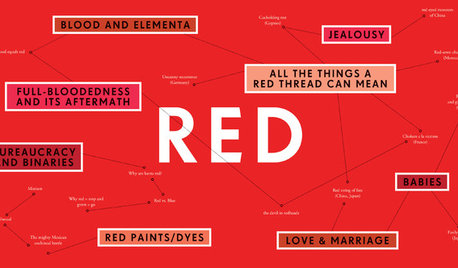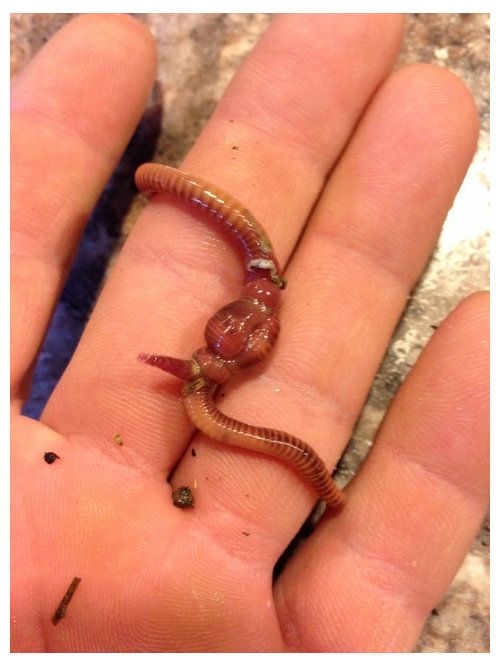Any worm experts here?
Why are my worms eating each other? They are braiding together by entering each other then exiting after the band. Hard to explain so here's a pic I found 2 sets in just one scoop? Any ideas??? They are fed daily mix of corn meal, egg shells, coffee grinds please help me this can't be good..
Comments (82)
Shaul
11 years agolast modified: 9 years agoPerhaps you would be better off at Vermicomposters.
http://vermicomposters.ning.com/They have 70 separate groups on every aspect of Worm raising and perhaps you will have better luck in finding someone to solve your problems.
Shaul
tulips101
11 years agolast modified: 9 years agoi have had a few ENC die on me the last few days and i thought everything was right because most of the worms are real lively the ones that died were short and chubby but looked healthy. Should i go thru the bed and remove these short ones or is this something that will not effect rest of my euroes. I have 2# divided into 2 10 gallon totes sure could use some advice thank you
Related Professionals
Ballwin Landscape Architects & Landscape Designers · Birmingham Landscape Architects & Landscape Designers · Buford Landscape Contractors · Hollywood Landscape Contractors · Lebanon Landscape Contractors · Lynchburg Landscape Contractors · Ponte Vedra Beach Landscape Contractors · Reisterstown Landscape Contractors · Rolling Meadows Stone, Pavers & Concrete · Bellingham General Contractors · Coffeyville General Contractors · Fremont General Contractors · Jacksonville General Contractors · Palestine General Contractors · San Carlos Park General ContractorsLisa.H
11 years agolast modified: 9 years agoBluegiller, I am sorry that your worms are dying and you don't feel like the forum is being as friendly and helpful as you would have liked. While I don't have any experience whatsoever with raising nightcrawlers, I keep my red wigglers in tupperware bins indoors, and have had success with about 6 inches of shredded paper as bedding, just wet enough to squeeze out a few drops and I always add some moistened peat moss as it seems to keep the moisture evened out. I feed kitchen scraps that have been frozen first, and always bury the food right in the middle of the bin, covered by a few inches of bedding and a thick layer of whole, dampened newspaper sheets on top of everything. I feed once a week, and when I do, I mix up everything in the bin (except any food that might be left over - I leave it right in the middle). My bins have 1/4 inch holes drilled along the top sides of the bin for air. I usually don't have to add any water, but each week if it seems a little dry I will add a little, or if too wet I will add more shredded paper bedding and a little more peat moss.
I realize that you asked for help with your bin, and didn't at all ask what I do that works for me and my type of worms, but this is the best I can do, and I thought I would at least offer some kind of friendly response! I have only had my worms for 9 months or so and killed off my whole first population, but have been pretty successful since then. I think if your bedding isn't too dense (you said it was very fluffy) and you've mainly fed manure, I would probably suspect wormer in the manure, too. If it were me personally, I would probaby try to pull out all of the healthy worms that I could and start over with fresh bedding and food. You say you hadn't planned to use kitchen scraps as you worry that it would sour your bedding, but if you think the manure may be poisoning your worms, I would probably try the scraps (frozen first) to see if they do better. Again, I do not claim to be any kind of expert or anything, this is just what I would personally try if it were my worms that were dying. I sincerely hope you are able to resolve whatever is killing your worms before you lose any more, as I know first-hand, as I'm sure many do, what it is like to lose a whole population, and for me at least it was pretty devastating. I wish you the best in keeping yours alive and well!
sbryce_gw
11 years agolast modified: 9 years agoIt is hard to diagnose a bin problem over the internet. You appear to be doing everything right. The bedding appears a little greener than I would have expected for aged manure. I have used fresh manure in small amounts, and I have used manure that was aged until it was black. I don't recall aged manure appearing green in the bin. Is it heating up? You had mentioned a slight smell Is it still there? Is it any stronger? Does it smell at all like ammonia? Does it smell at all like sewerage?
bluegiller_killer
Original Author11 years agolast modified: 9 years agoWell thanks for the help.. Much appreciated.. The manure was not as old as I normally have and not as black as normal was very dry too.. The smell is kinda onionish not sewer or ammonia.. I think all the worms will be dead by the end of the day it pretty much has to be wormer in the manure, because the bedding is perfect consistency and moisture..
bluegiller_killer
Original Author11 years agolast modified: 9 years agoAlso it may appear more green from all the store bought bedding and cardboard added.. It only added 1-5 gallon bucket of manure split between the 2 bins.. The rest is machine shredded cardboard and 2 packs of store bedding.. The smell is pretty much gone after turning everything yesterday it smells like good soil I even had my wife smell it too see if she could get any kind of smell of ammonia or rot and she said it smells like potting soil??
firecat
11 years agolast modified: 9 years agoTake some newspaper shreds then wet them down. Take any healthy Euro's and put them in there. I have saved many pounds of worms(ef's & eh's) doing this.
I'm thinking your bedding might be heating up.mendopete
11 years agolast modified: 9 years agoNo experience here, but I read on another forum about ENC NOT liking cardboard bedding. Maybe the protein in the glue causing "string-of-pearls" effect! Switching to peat or other bedding solved their problem.
Good luck!
bluegiller_killer
Original Author11 years agolast modified: 9 years agoSting or pearls? I don't think I'm dedicated enough to pick them all out especially when my goal was too put them in the garden to establish a growing population, that looks highly unlikely my love for worm bins has diminished drastically the last couple days I'm too the point if they die they die if I can add some food or water or bedding ill do it.. If its heating up what can I do?
mendopete
11 years agolast modified: 9 years agoI feel your pain! Do not give up!! I LOVE the bin design. Once you get past the start-up it gets easier.
String-of-pearls (SOP) is caused by protein poisoning. The worm looks like a pearl necklace from what I read. Cornmeal may contribute along with glue.
I just re-read your thread Daily feedings of any new bin is bad. Slow to start.
What kind of animal manure are you using? How old is it? Is it Pure or mixed with something like maybe bedding?? Has it been composted?
It looks like a LOT of bedding and manure mixed together for a new bin, which could easily overheat. Use frozen water bottles placed directly in bi for rapid cooling.
Even if they all die, do not give up. Worms will leave cocoons to start the next generation when things get better
Hang in there and good luck!.
equinoxequinox
11 years agolast modified: 9 years ago"So far I've found more skepticism and almost unfriendly attitudes on this forum.." That was probably me. I am sorry. I apologize. Many do not do research. You did do research.
bluegiller_killer
Original Author11 years agolast modified: 9 years agoThanks for the info.. Ill check the temp tomorrow with a digital thermometer..
I'm sure there was bedding in the manure it's almost impossible to get it without.. It had composted all summer but with the extreme dry heat the inside of the manure pile was dry and almost like dust in some places..
Here was my exact mix
1-15 gallon trash bag of shredded cardboard
1-5 gallon bucket of horse manure
2-packages of store bought worm bedding (brown bear or something has a bear holding a trout on the front of a white and yellow bag)bluegiller_killer
Original Author11 years agolast modified: 9 years agoNo I wasn't pointing a finger directly at anyone and you was helpful.. I know what you mean by people slopping things together then wondering why it didn't work.. I didn't do that but I came here looking for help/advice because its not easily attained.. I read books and looked through all kinds of info before setting this up and never heard of String of pearls now that I've heard of it I can find unlimited reading on it through the web.. Also I never read anything about over feeding them in a fresh bin, I did let the bedding sit for a week before I put anything in it.. Sometimes the info is not easily attained until you have specifics to look for, it's like telling someone to learn about cancer then after studying it for years you find out you only need too know about lung cancer and you actually know nothing about lung cancer (sorry for the horrible analogy lol).
11otis
11 years agolast modified: 9 years agobluegiller_killer: are you still buying the worm bedding? If you are, for the life of me, I don't understand why you use the store bought bedding.
Looking at your pictures, IMHO, it somehow looks too wet/compacted. Maybe because everything is so fine it doesn't allow air pockets.
Have you seen the cores of plastic bags in grocery stores? I collect them when I go shopping and use them in my bins. I rolled strips of corrugated cardboard (cut to that length or less) around it and burried them (usually four in my RM bins) like a chimney. That will allow air to the lower part of the bin and absorb excess moisture. Worms love to hang out around them.Reading from your first post up till now, I am sometimes confused of your actions/plans.
""I'm trying too grow enough worms to let a couple pounds go every summer in my garden and compost to establish a thriving population on their own..""
People usually collect worms from their compost pile to raise in their bins, not the other way round. When some of the worms get to the garden with the VC, so be it, but not let the worms go to fend with their own defences against birds, rats and other predators including nature/weather.
I understand you have Euros and if I understand it correctly, Euros prefer wetter condition, more organic/scraps (less paper products/bedding) and cooler condition compared to EF. Depends where you are in the US, I am questioning their survival chances in the garden.
Why go through all that trouble and let them die in the garden??? Sorry if I sound sceptical but I really try to understand your goal.
To my understanding, a garden is not the same as the wild (like in the woods/forest) where the earth is in constant shade and lots of leave litter.
Again my apologies, I'm not trying to rain on your parade. Before I can express suggestions, I need to understand what you are doing (or why).JerilynnC
11 years agolast modified: 9 years ago"" Posted by mendopete (My Page) on
Sat, Dec 29, 12 at 18:07No experience here, but I read on another forum about ENC NOT liking cardboard bedding. Maybe the protein in the glue causing "string-of-pearls" effect! Switching to peat or other bedding solved their problem. ""
I've read similar things. But never did see a good reference. I would be very surprised if cardboard and EH don't work well together. Color me skeptical.
bluegiller_killer
Original Author11 years agolast modified: 9 years ago" Reading from your first post up till now, I am sometimes confused of your actions/plans.
""I'm trying too grow enough worms to let a couple pounds go every summer in my garden and compost to establish a thriving population on their own..""
People usually collect worms from their compost pile to raise in their bins, not the other way round. When some of the worms get to the garden with the VC, so be it, but not let the worms go to fend with their own defences against birds, rats and other predators including nature/weather.
I understand you have Euros and if I understand it correctly, Euros prefer wetter condition, more organic/scraps (less paper products/bedding) and cooler condition compared to EF. Depends where you are in the US, I am questioning their survival chances in the garden.
Why go through all that trouble and let them die in the garden??? Sorry if I sound sceptical but I really try to understand your goal.
To my understanding, a garden is not the same as the wild (like in the woods/forest) where the earth is in constant shade and lots of leave litter.
Again my apologies, I'm not trying to rain on your parade. Before I can express suggestions, I need to understand what you are doing (or why). "
I'm trying to establish a good worm population in my garden.. I'm not really interested in vermicomposting or bin growing.. I'd just like a thick population in my garden so if I wanna go fishing I can go dig a couple fork fills and have a can of good fishing worms (european Nightcrawler is perfect).. And I had the store bought bedding prior to making this bin and added it when my bedding was too wet in the initial mix.. I use to buy my night crawlers for fishing in bulk and keep them in that bedding..As far as the bedding goes it might be too dry but its definately not compacted I was thinking of putting T's in on my PVC pipes and running them up to the top for more air..
I've found a lot of contradicting info on these worms and I'm starting too not believe any of it lol
This post was edited by bluegiller_killer on Sun, Dec 30, 12 at 19:18
wrcaz
11 years agolast modified: 9 years agoI think you may be on a good track with the change to ventilation. Looking at your pictures you drilled about the same amount of holes that I had in my bin. During the early days of checking daily, the lid would be dripping and the bedding seemed nicely moistened but worms were always trying to escape. I left the lid open a crack for better ventilation and the escapes stopped. Now the top of the bedding is a little dry when I check or feed but I just mist it down. Worms seem to be doing well and under the dry bedding the moisture content seems right.
equinoxequinox
11 years agolast modified: 9 years agoVermicomposting is more of art than a science. When we see people want to start with huge amounts of worms we all sort of roll our eyes. Having a batch of worms die is almost a right of passage for vermicomposters. It is better to have a pound die then 50 pounds.
Despite the material not being compacted it looks like I could plaster a hut with it. Maybe friability is the word we are looking for here. Crumbliness. Little cracks the air can get into the very center of the bin.
11otis
11 years agolast modified: 9 years ago""Despite the material not being compacted it looks like I could plaster a hut with it. Maybe friability is the word we are looking for here. Crumbliness. Little cracks the air can get into the very center of the bin.""
It doesn't look "f l u f f y""Shaul
11 years agolast modified: 9 years agoBluegiller;
You wrote: "I'm trying to establish a good worm population in my garden.. I'm not really interested in vermicomposting or bin growing.. I'd just like a thick population in my garden so if I wanna go fishing I can go dig a couple fork fills and have a can of good fishing worms (european Nightcrawler is perfect)".
So here's what you can do. Take the contents of your two bins and dump them into your garden beds. If they grow and thrive like you think they will, then wonderful, you've solved your problem; and then from there you'll have bait for fishing and for expanding worms into your other garden areas. On the other hand if they all die or don't thrive, then you'll know that your assumptions were not correct and you'll need to rethink your whole game plan; because at this point, this Thread is going absolutely nowhere.
This Thread has gone through over 50 Posts and you're no further along than you were at the start, and added to your frustration is the fact that you're losing money everyday.
You already said that you have no interest in "vermicomposting or bin growing" , so do what you originally planned to do and save yourself further aggravation .Shaul
equinoxequinox
11 years agolast modified: 9 years agobluegiller_killer: I only see one place online that has the information you posted about EH's on December 26 "We see a real future in these worms, which do well in lawn or garden." is at http://mypeoplepc.com/members/arbra/trinity/id8.html
I have seen other places advertise purchasing worms for a garden. Seems to me the best type of worms would already be in a garden, at the maximum amount the garden can hold with little to no seeding. To increase the amount of worms in a garden increase the organic matter. No purchasing necessary. The advertisers do not say it that way.bluegiller_killer
Original Author11 years agolast modified: 9 years agoI wouldn't say I'm losing money everyday.. More like wasted money the first day lol.. I'm just gonna let it play out
JerilynnC
11 years agolast modified: 9 years agoAlso be aware that even if the conditions in your garden support worm growth, some (most?) will be eaten.
Shaul
11 years agolast modified: 9 years agoEquinox & Jerilynn;
Please do not stand in the way of Scientific Research. The more you try to dissuade Bluegiller from doing exactly what he wanted to do from the beginning, the further we'll be from ever knowing whether the damned things will survive in the garden or not. And then the next time someone else comes along with the very same questions and the very same problems, we'll have to go through this same BS all over again, not being one iota closer to the truth than we are now. As Bluegiller said " Let it play out".
Shaul
PS. Bluegiller: You didn't lose money from the first day. You only lost money from when your worms started dying.
S.
dowbright
11 years agolast modified: 9 years agoTo have maximum worm populations in soil, if gardening, mulch, mulch, mulch, and use the worms that naturally will gather under it and reproduce. They love to find a great situation like a mulched garden. (I'm in the Midwest, so it's not an extreme wet situation.)
As you said, you don't want to raise worms, you want worms IN your garden. Grow and feed them there. :)
bluegiller_killer
Original Author11 years agolast modified: 9 years agoIf the worms make it too spring ill continue this scientific experiment in my garden.. Ill have too disagree on most of them getting eaten, I have a good nightcrawler/worm/grub population..
And the money was lost when I spent it on worms..
Also Shaul you shouldn't consider this "BS" it's a forum and providing help and advice is what they are designed for.. You don't like this "BS" maybe you should keep too yourself..
Anyways we can kill this thread ill provide updates prolly bi-weekly or
monthly..PS- I'll prolly have a couple sweet bins for sale in the spring unless I find a good strain to breed for the garden..
JerilynnC
11 years agolast modified: 9 years ago"" Posted by shaul Israel (My Page) on
Mon, Dec 31, 12 at 8:58Equinox & Jerilynn;
Please do not stand in the way of Scientific Research. The more you try to dissuade Bluegiller from doing exactly what he wanted to do from the beginning, the further we'll be from ever knowing whether the damned things will survive in the garden or not.""
We are probably standing in the way of anecdotal evidence, but your point is still valid. Go for it, Bluegiller! :)
bluegiller_killer
Original Author11 years agolast modified: 9 years agoAnecdotal evidence is about all I've been able to find on worms so the info should fit the bill perfectly..
Gerris2 (Joseph Delaware Zone 7a)
11 years agolast modified: 9 years agoI bet the hortensis worms are killer bluegill bait. Just the right size. I wish there were good fishing lakes close by Wilmington, Delaware, where I live.
Don't give up. I learn by doing and usually the first expeditions are not too successful. You learn from your mistakes and then become better for them. That's how I learned about growing plants too.
I am a member of Vermicomposters. It's a good group of people there.
Do you have survivors in the bins? They'll find each other and begin reproducing with time.
Joseph
equinoxequinox
11 years agolast modified: 9 years agoLong ago I put myself on Vermicomposters map. There was maybe nothing going on at the time on their forums so thus I am here. Also the site was not immediately clear to me how to use. Maybe due to a lot going on over there. I was a bit lost on it.
Having people on a forum that also post and read at other forums is a good thing.
Until the third term we are still almost a free country.
bluegiller_killer
Original Author11 years agolast modified: 9 years agoWorms are still alive and kicking.. I took the lid off and completely pour out and aerate the bedding weekly.. Still having a few dead maybe they'll all die slowly idk it's hard too tell..
bluegiller_killer
Original Author11 years agolast modified: 9 years agoGerris2 (Joseph Delaware Zone 7a)
11 years agolast modified: 9 years agoCongratulations! That's great news about life on your worm planet.
bluegiller_killer
Original Author11 years agolast modified: 9 years agoEverything has stabilized.. It seems to dry out alot faster than I thought it would.. I'm only gonna flip or add water at the beginning of each month.. I took a handful of worms out to fish with about a week ago ad left prolly 10-12 in the box when I was done I went back to the box a couple weeks later and there was 2 cocoons in the box.. So I guess everything is going good.. If anyone is interested in any info or pics let me know, open to suggestions and comments on why you think I went through such a rough patch a week after it was started that seems to have quit.. Also all the worms are very active and wiggly now unlike how they were there for awhile
equinoxequinox
11 years agolast modified: 9 years agoWhat do you think happened that turned the bin back to doing well?
bluegiller_killer
Original Author11 years agolast modified: 9 years agoI don't think it sat long enough before I put worms in it.. I think you should let them sit a month minimum of 2-3 weeks..
gvozdika
11 years agolast modified: 9 years agobluegiller_killer, your worms look just like mine. How do you know that they are Eisenia hortensis?
Sorry for your dead worms. I wish I found this forum earlier. I'm not an expert but the worms look the same (unless you have big hands). My worms don't mind wet condition, I think they even like wet, that's where they like to hang out. I would rightly suspect the bedding, cardboard or manure. I would just get them out of that bedding and feed them some tomatoes and carrot peelings. I use ripped paper grocery bags and egg cartons for bedding (parts without ink). Does anybody know how de-wormers affect compost worms?bluegiller_killer
Original Author11 years agolast modified: 9 years agoDid you read this whole thread? Everything is explained they are doing great now.. I know there euros because they look exactly like them.. Some are small some are big and fat and I do kinda have huge hands lol..
equinoxequinox
11 years agolast modified: 9 years ago"ripped paper grocery bags" I would think this would be a good bedding material mixed with other items. Nobody ever mentions it. A good use for them might be to put kitchen scraps into and then set on top of the bin. This keeps the fruit flys locked out.
firecat
11 years agolast modified: 9 years agoI'm interested now post up bro.
My thoughts on it is that the bedding was heating up and now it is not. The temps in the bedding of the bin are different than what the air temps are.
bluegiller_killer
Original Author11 years agolast modified: 9 years agoWhat are you interested in specifically.. I dug around in it a little tonight and it is loaded with cocoons and babies.. I'd say my bedding level has dropped almost 3" from them eating away.. Ill do another stir and moisten at the beginning of next month that schedule seems to be working good..
firecat
11 years agolast modified: 9 years agoIf you have some info you would like to share or a picture you like then post it up. I'll leave it up to you.
buckstarchaser
11 years agolast modified: 9 years agoThe pictures at the beginning showed massive breeding and quickly followed by dieing worms. This is transplant shock. The worm's new home was different than the one they came from and they could not live there so they were merely following worm protocol, which is to breed like mad until they inevitably die.
To me, the bedding looked too young. I could see flecks of stuff in otherwise unrotted cardboard noodles. There was a lot of water on the cardboard, but it was not broken down enough to absorb it propperly... This is just going on the pictures though. I did not technically see it with my own eyes so to speak. If you are really in a rush to start a bin without properly cooking the initial ingredients, you will likely have to start with finished compost. Compost is what you are doing when you prepare a bin ahead of time, and dried horse manure is not always compost. For example, I have dried bedding from chickens I had two years ago. If I put it in my bin to balance out a heap of cardboard and paper, it will rapidly start to off-gas ammonia because it was dried before having a chance to fully break down.
I suspect that the onion smell was hydrogen sulphide, which I associate with anaerobic activity under water. This happened in my bin before I drilled drainage holes in the bottom center to let standing water out. Even then, a lot of worms were living just above the water line where it smelled the worst.
I was looking for your reports of young worms after a couple months because of all of that panic breeding.
...Viola! You now know everything you need to know about growing worms and can begin your seminar touring and book writing career. You will have to make up some stuff to fill out the rest of the chapters and podium time though. Usually this is just done with anecdotal stories, jokes, and poorly drawn cartoon anthropomorphisms of worms with embarrassingly inaccurate gender references. A coffee stain would be a better graphic if it's not already trademarked intellectual property.From the beginning though, Bluegill... I could tell that things were going to get bad before they got better if you even let the experiment run because you have the trait of over-perfecting and a need to observe the experiment too often. The more you ignore worms, the better they will survive and multiply. Worms do not like disturbance whatsoever, and vibrations even cause them stress.
Your vent pipes in the bottom of the bin are a really nice idea. I like those. I suggest that you put wood chips in the bottom of the bin to cover them. The wood chips will allow the air to proliferate more fully while giving a high carbon area for water to pool. You could put a thick layer of newspaper on top of the wood chips to keep the worm compost separated if you wish, but that may have some impact on air transfer. The bottom of the bin could use some drainage to let the excess water out. I don't know if those bins there are very sturdy, but my bin is propped up with some holes drilled in the bottom center and a catch pan underneath. It's a large enough bin that I piped that pan to a bucket, where I use that liquid in conjunction with synthetic fertilizer (miracle grow) for my garden (as described in a university run worm experiment in Mexico... complete with actual scientific paperwork).
I know you've been told this a couple times already, but perhaps not with these words. If you want worms in your garden, all you have to do/the very best way to do it, is to put that manure, compost, and mulch on your garden. This will cause the existing local worms to go to your garden and multiply like wildfire. That's just a side benefit though. The real benefit is that you are putting manure, compost, and much on your garden and that all of the processes that will enrich your garden and hold moisture will be undisturbed and more vigorous in effect than simply putting a few pounds of worms on your dirt. You have just witnessed the natural behavior of worms dieing rapidly in response to environmental stressors. If you don't put good compost on the garden for the new worms to eat, they will likely die faster than they can effectively reproduce anyway, but if you simply put all of that material on the garden to begin with, the worms of your area will congregate there naturally. If you want to supplement your natural worms with some foreign species, that's different, but you also have to remember that if the worms do well enough to warrant their deliberate release into the wild, then that release of an exotic species is very likely to upset your local environment. Exotic worms have been blamed for wholesale forest destruction as well as wrecking land that used to be functional under the guard of indigenous worms. Of course EH worms are not blamed in either of these cases, but when you release something new in an established environment, the worst that could happen is that it successfully lives.
The following quote I transcribed word for word from one of my favorite TV shows on gardening, airing in 1987. It is from the BBC's The Victorian Kitchen Garden episode 3 of 13, titled "February".
"Farmyard manure like this (the host is standing on a massive pile of rotting straw bedding, heavy with manure) was dug into vegetable plots in huge quantities every year. Up to 100 tons an acre, which is the equivalent of a layer a foot thick."
I suppose you could repackage that concept as raised bed gardening and write a book on it, and I bet there will be worms in it.
equinoxequinox
11 years agolast modified: 9 years agoWhoa Nelly! Be still my beating heart. I felt like Princess Leia reading her first post by Darth Vader.
You gotta admit the picture clarity was excellent of the worm mating and worm kibbles and bits. Best I have seen.
I do like your quote "when you release something new in an established environment, the worst that could happen is that it successfully lives."
I probably agree with every sentence of the above post.
Do you care to comment, maybe in a new post, on any possible use of cowboy charcoal in a vermicompost system, especially any possible use as surface area for microbes?
Is there a great food or bedding source for worms that is often overlooked?
What do you think of those newfangled cloth worm bins with the draw string at the bottom and zipper at the top for in the living area of a house vermicompost systems for kitchen scraps in the winter in the north for homes with teeny tiny vermicompost systems?
What is your favorite bedding and food? Well actually for the worms. Although both you and the worms may prefer feathers and apple pie.
Everything posted online is free for the multitudes to use for personal, professional, business gain. Any thoughts on that? Google, which I search many times a day, is free. People put their work there. Many people put up very informative youtubes, way better than maybe even some college courses. Do you think the combined effort of many people putting their work on line for the next group to use and improve upon will make the world a way better place?
I way like your basing worm stuff answers on actual facts.
I have never been clear on do or do not worms, because they have a gizzard, need sand or grit? I feel no but that is not scientific. My research, googlie as it is has been wishy washy for results on this topic. Please tell me the common species of vermicompost worms do not need grit. On the other hand those posters that seem to know a lot about what they are doing seem to say that adding grit really improved worm and vermicompost output. What grit should I add? Surely not beach sand.
This board, or another one, used to have a lady who since moved on who provided research based worm information. Her posts are my vermicompost holy grail.
Perhaps you could be this boards new her? You might need a bit of a makeover though. She was very, very sweet.
buckstarchaser
11 years agolast modified: 9 years ago"Do you care to comment, maybe in a new post, on any possible use of cowboy charcoal in a vermicompost system, especially any possible use as surface area for microbes? "
Cowboy charcoal is the same as lump charcoal, right? I had never heard of it before by that name, probably because cowboys likely used found wood instead of hauling messy charcoal around. I don't think that charcoal is a bad thing, but it seems like extra effort to burn off substances that could have fueled your worms instead. Turning wood into charcoal would theoretically keep most of the ash content, but lock it away longer than a lifetime if the char was buried without further reduction. Granted, if you were doing a very long term, multigenerational project of land reclamation and had an unlimited budget, charcoal does stick around for a while and has the habit of adsorbing things that would have otherwise been washed below the root zone. Instead of washing away though, they would be locked away. From what I remember, clay has similar nutrient performance to charcoal, but you can amend the soil to forcibly unlock its treasure.
"the picture clarity was excellent of the worm mating and worm kibbles and bits. "
The worm kibbles and bits that I was referring to as undercooked were the cardboard bits. The cardboard looked like the dense stuff that one would find in a cereal box. I add this stuff to my bin and am not saying it's bad. Cereal boxes are often treated with a preservative called BHT. It's not considered harmful because people don't eat the boxes and BHT is the synthesized version of the natural wax found on apples. The BHT would likely repel moisture though, and thus the cardboard has not started to break down in the close-up image. As I was saying though, it really does not matter because the worms bypassed the waiting period by breeding and thus trying again when the food would be ready.
"Is there a great food or bedding source for worms that is often overlooked? "
You ask if there is a great food or bedding source that is often overlooked. My reply to that I've been saying over and over. Worms need space. The more space you give worms, the more they will be able to take care of themselves. The bin needs to be deep because worms will inhabit whatever depth they prefer, and different worms of the same species prefer widely varying bin microenvironments. A large bin also lets you perform hot composting right in the bin without threatening the worms or wasting the compost products or heat energy. They simply go away from what they don't like and toward what they do. I have performed this experiment in robots I've built in the past that had the equivalent of one brain cell but were fully capable of moving towards one stimulus and away from another. One braincell, but worms are smarter than that. The larger the bin, the more likely it will be outdoors where it doesn't matter if it smells a little and can manage it's own temperature in the cold. I live in zone 5 and my bin has already frozen and thawed through without apparent hardship. My bedding of most interest is fine wood chips, I have mostly newspaper and corrugated cardboard that I have put through a paper shredder that I modified, and that is acceptable bedding for outdoors. My favorite worm food input is dead animals, such as mice and frost-burned meat.
"What do you think of those newfangled cloth worm bins"
The cloth worm bins seem to have the advantages of a larger mass, more depth, and the much desired flow-through design. They also may keep people from digging around in them if they are awkward enough. On the downside though, their excessive exposure to air would likely make them unstable in varying conditions, inconsistent because of perimeter drying, and a maintenance hog. I don't have one of these though, so I can't tell you anything from experience.
You asked something about google and freedom of information. Information is not freely available on the internet. Most of it is copyrighted property of someone and using it for your gain will land you in trouble. This is a general hindrance to the betterment of mankind. A good example is that university research is generally free information to all because universities are heavily subsidized by government and donations, but whatever company that is holding it for you to look at will nearly always require you to pay for access to it. I feel this is against the spirit of government funded education and the nature of public information. Also, I have switched from google to bing for one reason. Google has a feature where you can block up to 500 domains from your search results. This is good because they often serve up loads of spam web pages that don't hold the data that was implied. But these pages are profitable for google, so google refuses to block certain pages from their manual (pain in the butt) block list. The pages that are refused blocking are always the crappiest ones that fill pages of results going to the same place. For this reason, and because I also use Firefox browser, I have switched to Bing because I can get a Firefox addon that will force-block results of my choosing (without the pain in the butt) from Bing's search results. The addon is called "bing results remover". Google and Bing give substantially the same search results with only a general change in the brand and attitude slant. This means that google will offer more of the pages that pay it to do so and offer more bing-slandering sites, while bing search will do the very same thing in its own benefit. This is another example of how the information is not free... but at least general information is more obtainable on a search engine than raw research publications from anywhere I've seen on the internet. This is ironic since the internet was created specifically to share research information. It was not freely available back then though either.
"I way like your basing worm stuff answers on actual facts. "
I'm basing worm stuff on my interpretation of observations, reading, and logic. If they sound more agreeable than other worm stuff, that alone does not make them actual facts. Furthermore, a fact is not guaranteed to be correct. I like to help and communicate information freely with the intention of being a good neighbor, or something similar, but I don't have anything to sell and make no money or have any financial interests related to worms or gardening besides growing food for myself and making fertilizer for my own use.
" Please tell me the common species of vermicompost worms do not need grit. "
I do not suspect that worms need special dietary care for their gizzards. If you suspect they do, then you can chuck some dirt on the bin. A worm gizzard is really small. At that size, it's not likely to have the same exact use as a chicken gizzard. I would not confuse the two animals. Furthermore, worms and chickens do not have a stomach like a human does. The crop and gizzard do the metering and mastication that a human uses its teeth and stomach for.
"This board, or another one, used to have a lady who since moved on who provided research based worm information. Her posts are my vermicompost holy grail.
Perhaps you could be this boards new her? You might need a bit of a makeover though. She was very, very sweet."Lead nitrate, arsenic, Ethylene glycol, phenylalanine aspartate, sodium saccharin and Kelly Slocum are all described as sweet. I would rather be described as bitter so as to serve as a warning that I'm not to be recklessly over-consumed, as no one should. I have no reason to be excessively nice or "sweet" and I consider that a virtue. I'm happy to learn and share what I learn. Some people think that's nice, some want that and a smile.
This post was edited by buckstarchaser on Sun, Feb 24, 13 at 2:04
hummersteve
10 years agolast modified: 9 years agoIve just been vermicomposting since april 2013 , at first [inside] I was having worms out on the floor often not a lot but a few. But since then things have settled down and its more of a rarety if I find one out . Just part of learning I suppose.
Anyway in following this discussion I was thinking about what I did in my garden bed this past year. I cut up a bunch of cardboard and covered the soil in an attempt to keep weeds down. Of course I watered down the cardboard down. Now Im thinking how many wigglers did I attract because of this deed and how many castings and soil improvement did I get in spite of myself-- just had to laugh at myself and also thought back to looking at the decomposing cardboard and the why's of and what was really happening.




















Shaul